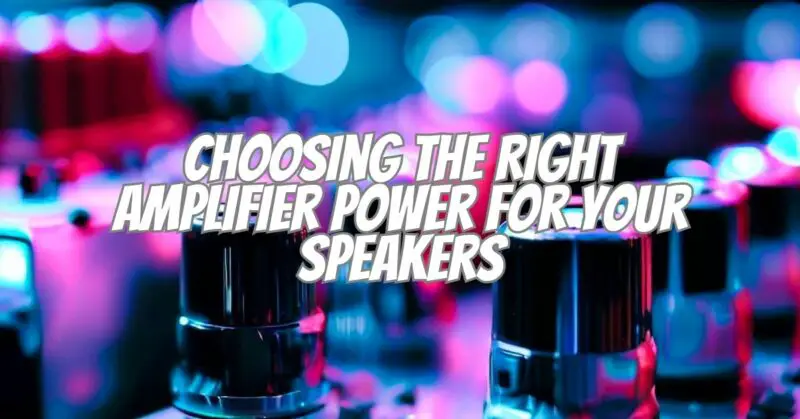When it comes to creating the perfect audio setup, choosing the right amplifier power for your speakers is a critical decision. Amplifiers play a vital role in delivering clear, distortion-free sound, and the power they provide can significantly impact your audio experience. In this article, we will explore the factors to consider when determining the recommended amplifier power for your speakers to help you make an informed decision.
Understanding Amplifier Power
Amplifier power, often measured in watts (W), indicates how much electrical energy an amplifier can deliver to your speakers. The relationship between amplifier power and speaker efficiency is crucial. Speakers are rated in terms of their sensitivity, typically measured in decibels (dB) at 1 meter with 1 watt of power. A higher sensitivity rating means the speaker requires less power to produce a certain volume level.
Matching Amplifier Power to Speaker Sensitivity
- Speaker Sensitivity: The sensitivity rating of your speakers is the starting point for determining the appropriate amplifier power. For instance, speakers with a high sensitivity rating (e.g., 90dB or more) require less power to achieve the same volume as speakers with lower sensitivity ratings (e.g., 85dB).
- Room Size: Consider the size of the room where you’ll be using the speakers. Larger spaces may require more powerful amplifiers to fill the room with sound adequately.
- Listening Preferences: Your preferred listening volume also plays a role. If you enjoy listening to music at higher volumes, you might need a more powerful amplifier.
- Speaker Impedance: Pay attention to the speaker impedance, usually measured in ohms (Ω). Amplifiers are designed to work with specific impedance ranges, so make sure your amplifier’s impedance matches that of your speakers.
Avoiding Underpowering or Overpowering
- Underpowering: Underpowering your speakers can result in distortion and clipping, which can damage the speakers over time. It may also lead to a lack of clarity and dynamics in your audio. To avoid underpowering, choose an amplifier that provides at least as much power as your speakers’ recommended minimum power rating.
- Overpowering: On the other hand, overpowering your speakers can also cause damage. Speakers can only handle a certain amount of power, so using an amplifier that delivers significantly more power than the speakers can handle may lead to blown drivers or voice coils. Always check the speaker’s maximum power handling specifications.
Calculating Amplifier Power Needs
To calculate the ideal amplifier power for your speakers, consider the following steps:
- Find your speakers’ sensitivity rating (in dB) and impedance (in ohms).
- Determine your preferred listening volume and the size of the room.
- Use online calculators or consult with audio experts to estimate the required amplifier power.
Conclusion
Selecting the right amplifier power for your speakers is crucial for achieving the best audio experience while preserving the integrity of your equipment. By understanding the sensitivity of your speakers, considering room size and listening preferences, and avoiding underpowering or overpowering, you can ensure that your amplifier complements your speakers perfectly. Don’t hesitate to seek advice from audio professionals or consult the manufacturer’s guidelines for your specific speaker and amplifier models to make an informed decision and enjoy crystal-clear, distortion-free sound.


